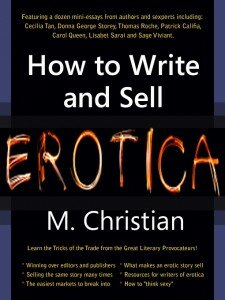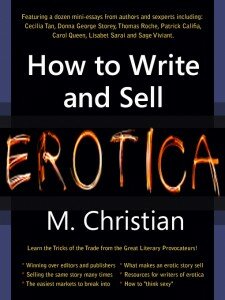When I need to write erotica, it’s usually because I have promised someone a story or book. I often draw a blank, and have to “jump start” myself with a concept, theme, or image. Therefore, I do a lot of thinking about how strong stories start.
When I say strong stories, I don’t mean stories you will think are strong — you, the reader. I mean stories I will think are strong — I, the writer. I need to generate a narrative critical mass to keep myself going through the first few thousand words of story — and by then, I’ll know one way or another if there’s a coherent narrative there, or something dull enough that I’ll abandon it.
I have literally dozens — possibly hundreds — of uncompleted novels on my hard drive; some of them are 200 words long. I’ve probably begun thousands, if not tens of thousands, of stories I’ve never finished. I’ve had lots of experience in what works for me, and what doesn’t. The problem is, what works is different every time, so I constantly have to fine-tune the process.
There’s nothing “wrong” with starting a story and not finishing it. But it becomes increasingly dangerous when you depend on writing to generate your income. False starts — on everything from short stories to novels to scenes-in-novels to conversations within scenes to individual character descriptions — are built into the writing process. But they don’t just spend time; they spend ideas. If I blow an opener and waste a story idea, that idea might feel depleted when I go back to them. Since I write for a living, every false start is a potential financial liability.
So when it comes to writing erotica specifically, these are the kinds of “jumps” that I often find can work for me in opening a story that I’ll want to continue.
What Works?
The first thing that almost always works for me is a visual description of a woman taking action in a non-sexual context that’s eroticized. Generally, this means she’s arriving somewhere. I usually frame this within the context of her clothing. I do this because I’m clearly Ed Wood reincarnated, and women’s clothes obsess me. In all seriousness, I do this because clothing provides clues as to what is about to happen, and describing a woman’s clothes could obsess me from now until doomsday.
The sluttier she is dressed, the better. If someone nudged her into dressing that way, better still, because then I’ve got a guaranteed conflict to begin with. Boyfriend talked her into it by promising you something dirty? W00t. Desperately need $200 and agreed to be a lingerie model at the car show on the very last day before she enters the convent? Ba-da-bing.
This all assumes, of course, that the female in question actually wanted to dress that way to begin with, but someone kind of eased her into it with the promise of some reward. This is not some cryptic anti-feminist message, though it certainly may have its problematic aspects. It’s the way my brain generates drama. I’m not saying it’s good drama…but it is drama. Basically.
On the other hand, If she just dressed that way because, you know, she’s “adventurous,” that’s fine too. The point, for me, is in describing the drape of her skirt, and exactly how precariously short it is, and how little room there is between that phenomenally short black skirt and the top of her black patent leather go-go boots, because clearly, I missed my calling and should have been a creepy clerk at Hot Topic.
The second thing that usually works for me is a description of someone’s facial expression. This starter very often does not stay at the beginning of the story, because I often find that there are stronger ways to start stories, from a reader perspective. But from a writer perspective, describing facial expressions is very hard for me — and I find that I like it. It allows me to describe something expressive, without having to commit to a specific set of interactions.
Describing facial expressions out of context creates many questions. Every character has expressions that are peculiar to them; as a writer, by picking a “way” someone looks, and then describing it, I create a static physical image that I don’t know the context of. Then I have to invent that context, and voila! I’m off and running. This often works.
Sometimes posture is integrated into the description; someone may be leaning forward and frowning, or leaning back and smiling, or turning his head and looking enigmatic, or pouting and brushing her hair. But the face is where it happens for me, in the theater of my mind — especially the eyes.
What Doesn’t?
There are two things, on the other hand, almost never work for me when starting a story. There are probably far more, but these are the two I’ve really noticed.
Unfortunately, I’ve found these things out by doing them over and over again. I often do them anyway, because apparently they’re central to the way my mind works. Half the time when I abandon a start after half a page, I discover I reflexively started it with one of the two things that doesn’t work.
The first thing that usually doesn’t work for me is a line of dialogue. For some reason, dialogue is excruciating to me. I hate it. I don’t like reading it, generally, and I really hate writing it. I think my dialogue sucks. I don’t particularly like talking to people in the real world, so why would I want my characters to talk to each other? Unfortunately, dialogue is an absolute deal-breaker in fiction. You’ve got to have it, or your story just won’t proceed.
Because it’s a method of jumping into a scene, I often fall prey to the temptation to start a scene with a line of dialogue. It’s almost always a disaster. If you’ve read an erotic story by me that starts this way, chances are that I added the dialogue later — or cut out an opening paragraph. Either that, or you’ve hacked my hard drive and you’re reading my unfinished crap.
The second thing that almost never works is a summary of events. That might get me further than a line of dialogue, but it usually won’t get me very far. “The night they first had sex was totally awesome” doesn’t ask any questions for me as a writer.
When I put stuff like that down on the page, I find myself shrugging. “So? Why say any more? You already said it.” Even if that summary is only backstory (“Though they started out with a strong mutual attraction, they had been having mediocre sex at best since he moved in to her place”), it lays out too many of the answers to questions I haven’t even asked yet. It’s not that it doesn’t give my mind room to work; it doesn’t make my mind work just to complete a scene that’s already in front of me.
That’s why I gravitate toward the concrete descriptions of physical realities that have social cues underlying them (clothes, expressions, posture).
Don’t think for a second I’m telling you that if you avoid these types of openers you will write more effective fiction. I think all these things work great as openers for stories. I’ll even go back and add either summaries or dialogue at the start of a story, once it’s written. I think both can be strong ways to start stories.
But in terms of getting the draft down on the (virtual) page, those kinds of openings don’t work for me as a writer — and the more I stick to the things that open my brain up to finishing a picture that’s already there, the more I let my subconscious do my work for me.
So…feel free to leave your views in the comments. What works for you, as a writer, to begin stories that you’ll want to keep going?Do you find yourself opening stories, predictably or reliably, with a certain kind of description, scene or interaction? And if so, how reliably does it work? Are there things that don’t work?
Share your ideas as you wish, and maybe we can each pick up some new ones.














Recent Comments